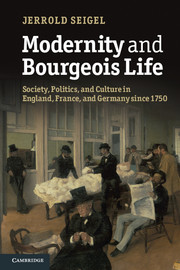 Modernity and Bourgeois Life
Modernity and Bourgeois Life Published online by Cambridge University Press: 05 June 2012
Fragmentation, consolidation, and the Bürgertum
No less paradoxical than the status of England as both the most bourgeois countryand the least, or the case of France as at once the homeland of modernrevolution and the country whose transformation during the nineteenth centurywas most gradual and the least complete, is the case of Germany. By manymeasures the country of the three where bourgeois groups retained theirpre-modern features for the longest time, and where middle-class influence overthe direction of government policy was weakest, it was nonetheless the placewhere the characterization of modern society and politics as“bourgeois” first found clear expression.
In its fully fledged form the notion only emerged during the 1840s, in thewritings of Marx and Engels, and soon after, rather differently, in theircontemporary W. H. Riehl (whom we will meet later in this chapter). But all ofthem relied greatly on Hegel’s theorization of bürgerlicheGesellschaft in his Philosophy of Right of 1821.In Hegel as in his German predecessors, bürgerlicheGesellschaft had a meaning best rendered in English as“civil society” rather than “bourgeois society”(Bürger also means a citizen in German), and theiruse of the term owed much to earlier discussions about it in other countries,notably eighteenth-century Scotland. But Hegel’s theorization differedfrom these others in a way that revealed its peculiarly German lineage. As willbe seen when we consider his analysis in a bit more detail later on, he made aclearer distinction between civil society and the state than earlier thinkersdid. The general notion of civil society as an organized form of social lifegoverned by laws made it seem natural to consider political authority as part ofit; but rulers and administrators in Germany sowed the seeds of their separationby taking bürgerliche Gesellschaft as an object of stateaction and policy, focusing on social relations and private behavior as targetsof their efforts to improve and develop their territories. Hegel’s cleardistinction between society and the state gave more explicit theoretical form tothis division. In doing so he provided the starting point from which Marx, in adialectical reversal of a kind he first learned from Hegel, would turn thenotion of bourgeois society as a formation whose development and elaborationserved the aims of state policy into the idea that state power had to besubservient to the needs of society’s dominant forces.
To save this book to your Kindle, first ensure no-reply@cambridge.org is added to your Approved Personal Document E-mail List under your Personal Document Settings on the Manage Your Content and Devices page of your Amazon account. Then enter the ‘name’ part of your Kindle email address below. Find out more about saving to your Kindle.
Note you can select to save to either the @free.kindle.com or @kindle.com variations. ‘@free.kindle.com’ emails are free but can only be saved to your device when it is connected to wi-fi. ‘@kindle.com’ emails can be delivered even when you are not connected to wi-fi, but note that service fees apply.
Find out more about the Kindle Personal Document Service.
To save content items to your account, please confirm that you agree to abide by our usage policies. If this is the first time you use this feature, you will be asked to authorise Cambridge Core to connect with your account. Find out more about saving content to Dropbox.
To save content items to your account, please confirm that you agree to abide by our usage policies. If this is the first time you use this feature, you will be asked to authorise Cambridge Core to connect with your account. Find out more about saving content to Google Drive.